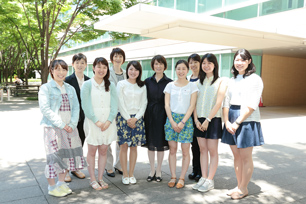Hiroko Komatsu, Professor, Faculty of Nursing and Medical Care
Creating a Care System from the Perspective of the Tojisha
For our project, we conduct research based on fieldwork that aims to create a care system together with the tojisha[the person concerned] from the perspective of the tojisha—who are the patients, general public, and people with health issues. The key to achieving this is respect and trust.

A super-ageing society signals an “era of care.” Not only do we need to cure acute diseases, but we also need to urgently develop a care system that supports people’s lives and way of living to treat difficult-to-cure illnesses such as chronic and lifestyle-related diseases. While it is easy to grasp the idea of ongoing dietary, drug, and exercise therapy, making them a part of everyday life requires extraordinary effort. This is because people’s actions in relation to their health are associated with factors such as their personal history, environment, and relationships with other people, and the inherent meaning and values are all different.
In the frontiers of cancer treatment, we have seen a major shift toward outpatient treatment. Some older people who are receiving ongoing molecular-targeted therapy against cancer promise their doctors that they would not forget to take medicine that can keep them alive, while they confess to the nurses before leaving the hospital that they will only take half the dose because of the strong side effects. Why do patients experience these conflicting feelings? The only way to answer this question is by listening to what the patients have to say and understanding what they are really thinking and feeling.
In order to care for the patients in this way, tojisha studies, or person-centered studies, are essential. Until now, the tojisha were seen as “objects,” but in this field of study they occupy a central role and are treated as the “subjects.” Tojisha study is about the tojisha (e.g. patients) themselves seeking answers about themselves, the society they live in, and the care system.
For our project, we conduct research based on fieldwork that aims to create a care system together with the tojisha from the perspective of the tojisha—patients, general public, and people with health issues. To put yourself in the shoes of the tojisha is not about identifying areas that caregivers are not doing enough or what kind of difficulties they may be facing. It is about working together to find solutions by believing in the abilities and intentions of the caregivers and showing them respect. This attitude as a researcher must also exist between students and between students and faculty. There are only a small number of us working on the project at the moment, but this circle is gradually expanding as we are headed toward an “era of care.”
Student's Voices
Kaori Minato
Fourth-year student, Faculty of Nursing and Medical Care
Discovering the Fun of Nursing Research
The project led by Prof. Komatsu is primarily about research on patients that have chronic diseases or are in their final stages of their illnesses and nursing family members. We receive guidance from Prof. Komatsu and other faculty members, and my interest in nursing research grows day by day. I am particularly interested in peer support for cancer patients (mutual support between the tojisha), and recently I conducted fieldwork for a support program for women living with breast cancer. I was able to hear directly from women about the difficulties they are facing and honest thoughts and feelings that can only be shared with people who have experienced the same condition. I also felt the power of peer support. From here, I would like to pinpoint what I am really interested in and make the best use of my fieldwork experience in my own research.
*Position titles, etc., are those at the time of publishing.
